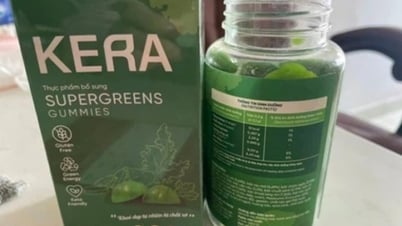Gastroesophageal reflux disease (GERD) is a chronic digestive disorder that occurs when stomach acid flows back up into the esophagus. The most common symptom is a burning sensation in the chest (heartburn), accompanied by a sore throat, dry cough, or difficulty sleeping. According to the Gastrointestinal Disorders Foundation, up to 79% of people with GERD experience symptoms at night, disrupting sleep and negatively affecting their daily lives.
One often overlooked risk factor is what you drink the night before bed. Here are some drinks people should limit to reduce the risk of nighttime acid reflux:
1. Orange juice
Although orange juice is rich in vitamin C and antioxidants, it also contains citric acid, a compound that can relax the lower esophageal sphincter, the muscle that keeps stomach acid from flowing back up, according to the Cleveland Clinic. When this muscle is relaxed, acid can easily flow back into the esophagus, especially when you're lying down to sleep. Additionally, drinking orange juice at night can stimulate the stomach to produce more acid, making discomfort worse.
2. Coffee
According to Healthline, coffee is one of the leading "culprits" causing acid reflux. Not only because of its high acidity, but the caffeine in coffee also stimulates the secretion of stomach acid and relaxes the lower esophageal sphincter, similar to citric acid in orange juice. A study published in the Journal of Gastrointestinal Pharmacology and Therapeutics also showed that consuming caffeine too late in the day can increase the risk of insomnia and lead to symptoms of gastroesophageal reflux.
3. Carbonated drinks
Carbonated soft drinks and carbonated mineral water can increase the pressure in the stomach, making it easier for acid to be pushed up into the esophagus. In addition, these drinks often contain phosphoric acid, which can irritate the lining of the stomach and esophagus. Some also contain artificial sweeteners or high amounts of sugar, which slow down digestion, causing acid to stay in the stomach longer, increasing the risk of reflux, especially if you lie down immediately after drinking.
4. Hot Chocolate
Hot chocolate may seem like a relaxing choice before bed, but it’s not good for people with acid reflux. The drink contains both caffeine and theobromine, two substances that can relax the lower esophageal sphincter. In addition, hot chocolate is often mixed with whole milk or cream, which increases the fat content, which slows digestion and makes reflux more likely. If you love chocolate, choose a non-dairy, low-fat version, and it’s best to avoid it altogether in the evening.
To improve sleep quality and control GERD symptoms, avoid eating or drinking anything 2–3 hours before bedtime. Choose soothing beverages such as warm water, caffeine-free herbal teas (chamomile tea, ginger tea), and low-fat almond milk.
(According to Vietnamnet.vn)
Source: http://baovinhphuc.com.vn/Multimedia/Images/Id/128756/4-do-uong-nen-tranh-truoc-khi-di-ngu



![[Photo] T&T 1 and Ho Chi Minh City 1 People's Police Teams won the men's and women's team championships](https://vphoto.vietnam.vn/thumb/1200x675/vietnam/resource/IMAGE/2025/5/22/39db06ae67cb4001b7a556e8d9a56d07)



























































































![[Podcast] Week introducing more than 500 OCOP products in Hanoi](https://vphoto.vietnam.vn/thumb/402x226/vietnam/resource/IMAGE/2025/5/22/d144aac2416744718388dbae3260e7fd)

Comment (0)